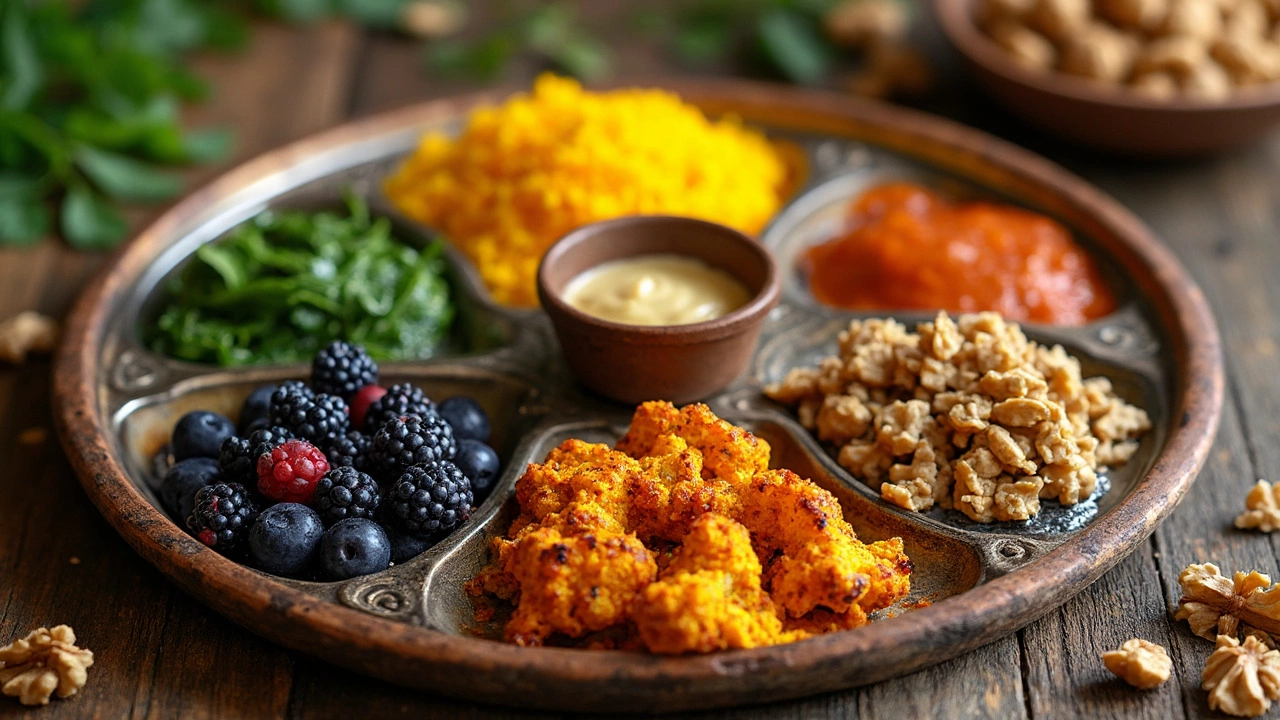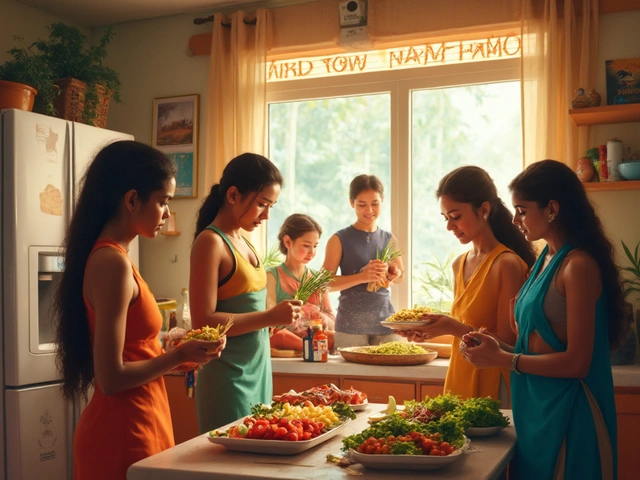
If you rummage through most people’s fridges, you’ll probably spot a bunch of stuff that never makes headlines—like broccoli, berries, or a lonely onion rolling around the bottom shelf. Weirdly enough, these ordinary foods are hiding some serious cancer-fighting power. You don’t need rare superfoods or a Hollywood chef. It’s often the simple things you toss in your cart (or forget to) that can make the biggest difference.
Picture this: Just by swapping out chips for a bowl of berries or tossing some broccoli into your pasta, you’re giving your body more tools to protect itself. Scientists have shown certain foods can slow down damage to our cells, help our bodies clean up trouble before it starts, and even reduce the chances that cells turn cancerous in the first place. Sounds pretty good for a five-minute tweak to your lunch, right?
Eating smarter is not about cutting out everything and living on kale. It’s about knowing which foods help, why they do, and how you can make them part of what you actually want to eat.
- Why Food Matters in Cancer Prevention
- Broccoli: The Powerhouse Veggie
- Berries: Tiny but Mighty
- Leafy Greens: Simple Greens, Big Impact
- Garlic and Onions: Kitchen Staples that Count
- How to Build a Cancer-Fighting Plate
Why Food Matters in Cancer Prevention
Most people don’t realize how much their daily meals can impact their risk for cancer—especially the foods you reach for again and again. The connection is real. Around one in three cases of cancer in the U.S. could be avoided by sticking to a healthy diet, regular exercise, and keeping a healthy weight. That’s massive.
Here’s why your food choices matter: Some foods are jam-packed with nutrients, antioxidants, and natural plant compounds that help your body defend itself. These defense systems catch cell damage, lower inflammation, and help get rid of harmful substances before they mess up your cells and start a chain reaction that could lead to cancer.
- Antioxidants in fruits and veggies help fix cell damage caused by everyday life. Too much cell damage, and you’ve got a setup for cancer.
- Certain cancer fighting foods can even slow the growth of weird or abnormal cells, giving your body’s own guard system (your immune system) time to handle things.
- Whole foods like fruits, veggies, nuts, and whole grains have fiber. Fiber helps your body get rid of waste and bad stuff, so things don’t stick around long enough to cause problems—especially in the colon.
Check out this simple breakdown showing the protective goodies found in some common foods:
| Food | Key Benefit |
|---|---|
| Berries | High in antioxidants (vitamin C, anthocyanins) |
| Broccoli | Contains sulforaphane, a special plant chemical that fights cell damage |
| Garlic | Has allicin, which is linked to cancer-fighting effects |
| Leafy greens | High in vitamins and fiber that protect DNA |
No need to memorize long food lists. Just start swapping in more whole, colorful foods, and you’ll pack your diet with natural protectors. Every plate is an opportunity to build a barrier against cancer—so even small changes, over time, really add up.
Broccoli: The Powerhouse Veggie
Broccoli might not win any awards for excitement, but when it comes to cancer fighting foods, it’s hard to top. Here’s the deal: broccoli is packed with sulforaphane, a natural compound that helps your body fight off cancer by lowering inflammation and protecting your cells from damage. Researchers have found that sulforaphane can shut down enzymes linked to cancer growth. There's even a real-world study out of Johns Hopkins where people who ate broccoli sprouts had measurable changes in how their bodies cleared out toxins linked to cancer—seriously impressive for such a common veggie.
But that's not all. Broccoli is stuffed with fiber, which helps move stuff through your system and keeps your gut healthy. And a healthy gut means your risk of certain cancers, like colon cancer, goes down. Plus, broccoli delivers vitamin C, vitamin K, and a good dose of antioxidants, all working together to keep your body in fighting shape.
Not a big fan of eating it plain? You don’t have to force it down raw. Here’s how you can make broccoli actually taste good while still hanging onto most of those cancer-fighting benefits:
- Lightly steam broccoli instead of boiling it. Boiling can zap away sulforaphane and other nutrients.
- Toss broccoli into your stir-fry or pasta. Quick, easy, and way better than just plain veggies on a plate.
- Make a broccoli pesto—blend it up with garlic, olive oil, and a pinch of parmesan.
- Pair with vitamin C-rich foods like red bell pepper to help your body absorb even more goodness.
Here's a quick look at what one cup of cooked broccoli brings to your plate:
| Nutrient | Amount per cup | Why it matters |
|---|---|---|
| Fiber | 5 grams | Keeps digestion healthy, lowers colon cancer risk |
| Vitamin C | 81 mg | Fights cell damage, boosts immune system |
| Sulforaphane | Up to 73 mg | Helps detox your system and fights cancer cells |
So, the next time you pass by the broccoli at the store, toss a head in your basket. It could be one of the easiest changes you make to stack the odds in your favor when it comes to healthier eating and cancer prevention.

Berries: Tiny but Mighty
Grab a handful of berries—blueberries, strawberries, raspberries, even blackberries—and you’ve got more cancer fighting foods than most supplements could ever promise. Berries pack serious amounts of antioxidants, those little bodyguards that protect your cells from getting damaged, which is where cancer usually starts.
Specific compounds called anthocyanins and ellagic acid show up in huge amounts in berries. Researchers from the American Institute for Cancer Research say,
“Berries are linked to reduced inflammation and lower cancer risk in large studies. Their antioxidants repair DNA damage that can trigger cancer.”
One huge plus about berries is you don’t have to eat a mountain of them. Eating a cup of fresh or frozen berries a day has been shown in real studies to boost your body’s defense system.
| Berry Type | Main Antioxidant | Cancer Prevention Benefit |
|---|---|---|
| Blueberries | Anthocyanins | Helps stop tumor growth |
| Strawberries | Ellagic Acid | Protects DNA from damage |
| Raspberries | Quercetin | Fights inflammation |
Here’s something practical: pop berries onto your oatmeal, toss them in salads, or just grab a snack pack for work. You don’t need to buy organic or fancy brands. Even frozen berries work—just check the label for added sugar. Honestly, berries might be the easiest way to sneak more healthy diet upgrades into your day while fighting chronic disease at the same time.
Leafy Greens: Simple Greens, Big Impact
You know those bags of spinach, kale, or lettuce that stare at you from the bottom shelf? They’re way more than just salad filler. Leafy greens have some of the highest levels of vitamins, fiber, and natural cancer fighters you'll find in any produce aisle. If you care about cancer fighting foods, these greens should be regulars on your plate.
What’s actually in them that helps? A bunch of things. Spinach, kale, and collard greens are loaded with antioxidants—especially carotenoids like lutein and zeaxanthin—which work sort of like a cleaning crew that sweeps up cell-damaging molecules. There’s also folate, a B vitamin, which studies connect to a lower risk of some digestive tract cancers, like colon or stomach. Don’t forget the fiber, either. Higher fiber diets have shown real impact on cutting bowel cancer risk.
Try tossing in more greens here and there. You don’t need complicated recipes. Here are easy ideas you can use right now:
- Add a handful of spinach into your scrambled eggs in the morning. The taste won’t overpower anything, and you get a boost right away.
- Stuff leaves of romaine or butter lettuce instead of tortillas when making wraps. It’s crunchy and way lower in calories.
- Blend kale or chard into fruit smoothies. You won’t even notice it’s there once you add fruit and yogurt.
- Stir a cup of chopped greens into soups or pasta right at the end. They wilt fast and keep their nutrients.
Some research even found that people eating leafy greens four or more times a week could cut their cancer risk, especially for digestive cancers, by up to 40% compared to folks who skipped them.
| Leafy Green | Main Benefit | How to Use |
|---|---|---|
| Spinach | High in folate | Omelets, salads, smoothies |
| Kale | Packed with carotenoids | Chips, stir-fry, soups |
| Romaine Lettuce | Crispy & hydrating | Wraps, salads, sandwiches |
| Swiss Chard | Rich in fiber | Soups, sautés, pastas |
The cool thing is, you don’t have to eat a mountain of greens at every meal. Even simple swaps (like subbing lettuce wraps at lunch) add up if you keep it up. Leafy greens are simple, cheap, and one of the best ways to get real cancer prevention working for you every single day.

How to Build a Cancer-Fighting Plate
If you want your meals to actually help you in the fight against cancer, the first thing is to make cancer fighting foods the star, not the sidekick. It’s not about eating perfectly every single meal, but making smart swaps and building habits around real foods that genuinely matter.
Here’s a straight-up way to organize your plate so you get the most benefits:
- Half your plate: Veggies and fruits. Make this the goal every time. Berries, leafy greens, broccoli, tomatoes—load them up. These are packed with antioxidants, fiber, and phytonutrients that help block damage to your cells.
- One quarter: Whole grains. Go for brown rice, quinoa, oatmeal, or whole wheat bread. Fiber in these foods keeps things moving and has been linked to a lower risk of colon cancer in studies.
- One quarter: Lean protein. Beans, fish, chicken, or tofu work well. Red and processed meats? Try to keep those rare, not regular.
Some extras that go a long way:
- Healthy fats. A drizzle of olive oil or a few nuts can boost flavor and deliver healthy fats, which your body actually needs.
- Garlic and onions. Don’t skip them. They both pack cancer fighting natural compounds, and you can toss them into just about everything for more punch.
Aim for color and variety, not just green or brown. The more colors you have from natural foods, the better mix of antioxidants you’re getting.
| Component | Examples | Why It Helps |
|---|---|---|
| Veggies/Fruits | Broccoli, spinach, berries | Packed with antioxidants and fiber |
| Whole Grains | Brown rice, quinoa, oatmeal | Supports gut health, lowers colon cancer risk |
| Lean Protein | Beans, fish, chicken, tofu | Builds strength, keeps you full |
| Healthy Fats | Olive oil, nuts, seeds | Delivers cell-friendly fats |
| Seasonings | Garlic, onion, herbs | Natural cancer defensive compounds |
Don’t sweat the occasional burger, but try to let these foods hit your plate more often than not. As a tip, prepping veggies in advance in containers or keeping frozen berries around makes it much easier to stick with it. Swap soda for water or green tea (which is also loaded with cancer fighting antioxidants). Small steps, like these, add up over time and can actually protect you for the long haul.





Rohan Talvani
I am a manufacturing expert with over 15 years of experience in streamlining production processes and enhancing operational efficiency. My work often takes me into the technical nitty-gritty of production, but I have a keen interest in writing about medicine in India—an intersection of tradition and modern practices that captivates me. I strive to incorporate innovative approaches in everything I do, whether in my professional role or as an author. My passion for writing about health topics stems from a strong belief in knowledge sharing and its potential to bring about positive changes.
view all postsWrite a comment